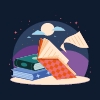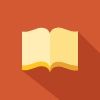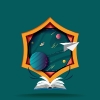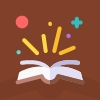Although most famous as a sci-fi author, Isaac Asimov was a professor of biochemistry at Boston University who wrote popular science books. Alongside American science fiction writers Arthur C. Clarke and Rob Heinlein, he was considered to be part of the famous Big Three. Asimov was nothing short of a successful and prolific writer. He won various awards for some of his 500+ books, including the Nebula Award six times.
Asimov is most famous for his science fiction stories, including the Foundation series, the Galactic Empire series, and the Robot series. For Foundation and Earth, he won the Hugo Award. When it comes to other stories, Asimov’s most important work includes Nightfall, which was voted as the best sci-fi story by the Science Fiction Writers of America in 1964. On another note, Asimov’s Science Fiction magazine is still up and running.
Understanding Isaac Asimov and his impact on science fiction
Asimov’s work in literature is mostly divided into two phases. The first is mostly sci-fi based, ending in 1957 when he wrote The Naked Sun. During the first phase, Asimov came up with what we know as The Three Laws of Robotics. This is a set of rules which applies to most science fiction written after the laws were introduced by Asimov and other sci-fi authors.
After that, Asimov mostly wrote non-fiction and only four science fiction novels. This lasted until 1982. After the publication of the Foundation’s Edge, Asimov’s second spell in sci-fi began, and it lasted until his death. It is at this time that terms like positronic and psychohistory would be coined and included in the Oxford English Dictionary.
An intimate look at Isaac’s personal life
Born in Petrovichi, Russia, in 1919 to a Russian Jewish family, Asimov came to the United States in 1923 as a child. His parents spoke to him only in English; hence he never learned Russian and was able to teach himself how to read at the age of five. A couple of years later, he began visiting the local library in Brooklyn, where he would borrow sci-fi books that had the most impact on him during his formative years.
Asimov finished the Boys High School in New York City, after which he got a scholarship in Columbia University’s branch—Seth Low Junior College. He worked as a full-time professor of biochemistry at the Boston University School of Medicine during the 1950s and 60s. Asimov married twice. His first wife was Gertrude Blugerman, with whom he had two children. His second wife was Janet Jeppson, a psychiatrist and also a sci-fi writer.
Isaac Asimov’s most popular fiction and non-fiction books
The Shakespeare of sci-fi, Asimov’s work is full of amazing stories, both fictional and otherwise. As such, let’s look into some of his best work.
I, Robot (1950)
Nowadays, mostly popular due to a 2004 sci-fi film of the same name, I, Robot is a collection of nine robot stories that Asimov wrote during his first phase. Unlike the films, there are no hordes of killer robots but interesting plot lines that will intrigue you and your science-loving mind.
The Caves of Steel (1954)
Part of the Foundation Trilogy, The Caves of Steel, tells a story of a detective and robot working together to solve a murder mystery. This book goes to show Asimov’s idea that sci-fi doesn’t have to be a genre in itself but could be applied to any of the existing ones, such as crime thrillers.
The Naked Sun (1957)
Another sci-fi murder mystery, Asimov’s The Naked Sun, is a story about a detective investigation of the death of a fetal scientist who was operating on the planet Solaria, which is hostile to Earth. Just like The Caves of Steel, it goes to show how sci-fi works well with other genres.
The Robots of Dawn (1983)
The third part of the Robot series, The Robots of Dawn, is a sci-fi novel someone like Agatha Christie would have written if she was into science fiction. In other words, it’s a whodunit story that will keep you guessing until the very end.
The End of Eternity (1955)
Once again, Asimov doesn’t shy away from elements of mystery and thriller in The End of Eternity. However, this time, the story has a major emphasis on social engineering and time travel. The End of Eternity ties in with the Foundation and Empire timeline.
Nightfall (1941)
Nightfall is a short story by Isaac Asimov that tells a tale of a plant whose people were constantly lit by sunlight and are now witnessing the coming of darkness. The story was adapted into a novel in 1990 by Robert Silverberg, but Asimov’s original work remains a better-liked version.
Foundation (1951)
A 1951 space saga, Foundation is one of the best works by Isaac Asimov. The storyline follows a group of scientists at an institute that’s devoted to saving a galactic empire from the worst outcomes of its impending demise.
Isaac Asimov’s Treasury of Humor (1968)
If you enjoy Isaac Asimov’s work but you’re a bit tired of astounding science fiction, his Treasury of Humor is the perfect book for you. It’s a collection of his favorite jokes and anecdotes that will lighten your mood, despite all the gloom his sometimes dystopian novels might offer.
The Asimov Chronicles: Fifty Years of Isaac Asimov (1989)
With 48 short sci-fi stories with elements of thriller and mystery, Fifty Years of Isaac Asimov is a perfect collection of some of his best works. It also contains two science essays, well worth your time, even if you don’t have a clue about what he’s on about.
Isaac Asimov’s Book of Science and Nature Quotations (1988)
Sorted by different subject matters. Isaac Asimov’s Book of Science and Nature Quotations is for the die-hard fans of the late great author.
The Solar System (1961)
For science lovers, The Solar System by Isaac Asimov is a collection of his selected science essays on various matters that concern our solar system. It’s a great piece of popular science literature that everyone can get into and learn something new.
Isaac Asimov’s notable contributions to science and religion
Isaac Asimov wrote numerous scientific essays that were mainly targeted at a broader audience. Although a professor at Boston University School of Medicine, he enjoyed delivering popular science to the masses. As such, he is responsible for thousands of people getting into science fiction and, in turn, science itself.
When it comes to religion, Asimov was an atheist. He was a humanist and a rationalist, in his own words. However, he wasn’t vocal about disregarding popular religions. He enjoyed religious themes, which is best seen in his book Isaac Asimov’s Guide to the Bible, in which he tried to explore the Old and New Testaments with his own spin on it.
Listen to more science fiction books on Speechify Audiobooks
If you love sci-fi or science books, Speechify Audiobooks is for you. Speechify Audiobooks has a vast library of over 70,000 titles, including many thrilling science fiction novels and non-fiction works covering various science-related topics, so you’ll never run out of options. Speechify Audiobooks even offers multiple audiobooks of Isaac Asimov’s work, such as The Science Fiction Hall of Fame, Vol. 2-B, Robot Visions, and Robot dreams.
Don’t have time to read books? Audiobooks solve that problem, allowing you to easily multitask throughout your day and still read great works. Simply listen to them as you go about your daily chores, work or even drive, and enjoy an interesting story or learn about a new and intriguing topic.
Sign up for Speechify Audiobooks today and get your first premium audiobook for free.
FAQ
What is Isaac Asimov most famous for?
- Astounding: John W. Campbell, Isaac Asimov, Robert A. Heinlein, L. Ron Hubbard, and the Golden Age of Science Fiction
- The Stars, Like Dust
- The Gods Themselves
- Pebble in the Sky
- Second Foundation
- Forward the Foundation
- Marooned Off Vesta
- The Roman Empire
- The Currents of Space
- Asimov: A Memoir
- In Joy Still Felt
- The Bicentennial Man
- In Memory Yet Green
What was Isaac Asimov’s IQ?
During his service in the army, Asimov took an IQ test in which he scored 160, which was well above the rest of his group.
What did Asimov think of Star Wars?
Although he generally liked Lucas’ Star Wars, Asimov wasn’t all that impressed with special effects, which were the major selling point of the mentioned movie franchise.
What did Isaac Asimov die of?
Although contracting HIV after a blood transfusion in 1983, Asimov died of kidney failure in 1992.
What is the name of the first book in the Foundation series?
Although written later as a prequel, Prelude to Foundation is the first book in the Foundation series, according to the story timeline.
What is the most famous robot in Asimov’s stories?
R. Daneel Olivaw is the most famous of Asimov’s robots, with the R in his name standing for Robot.












